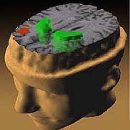Sharply pronounced attacks of panic (panic attacks) are one of the most dramatic manifestations of the impact of subconscious on mind and body.
Content
What is a panic disorder?
Panic disorder is the most real disease that has both mental and somatic (bodily) basis.
Although stressful situations or psychological conflicts and may aggravate the symptoms of panic disorder, its cause is still biological disorders in the central nervous system. The predisposition to these physiological shifts may be hereditary.
Who has it arises?
Panic disorder is a fairly common disease. At any time it can happen from several million people. Typically, the disease begins at the end of the second - the beginning of the third decade of life and can develop both men and women. However, women constitute the majority of (75%) patients, possibly due to some not yet understandable biochemical or physiological factors.
What are panic attacks?
Panic attacks are called sudden moments of severe alarm. For panic attacks, especially at the beginning of the disease, a typical unexpected start - without any precursors and no apparent reason. The attacks may be accompanied by a variety of symptoms, which includes:
- dizziness or feeling of badness;
- difficulty breathing;
- sensation of suffocation or shortage of air;
- instability or step by gait;
- Student heartbeat (heart jumps);
- Painful pain or sensation «Streamed» in the chest;
- tingling or numbness in various parts of the body;
- nausea, diarrhea;
- Feeling «Strange» or «Unreality» ambient;
- Fear of death, the fear of going crazy or lose composure.
Panic attacks usually last from one minute to one hour and occur on average two to four times a week. In some cases, the attacks disappear for a long time, and then, without a visible reason, return again. The severity of the attacks can significantly differ even at the same person.
Can panic attacks lead to something more serious?
Panic attacks can cause people suffering and significantly «poison» they live, but they are not dangerous in the sense that they can not be the cause of death. Over time, many people experiencing repeated panic attacks are becoming more disturbing even between attacks. They may develop one or more phobias, and they can begin to be afraid and avoid those places and situations in which their attacks are overtaking: for example, during the coating of people, in elevators, on motorways.
In the end, they can begin to be afraid to build plans, travel and even go shopping. It may entail adverse effects for social and family life, as well as for work.
Is it possible to treat a panic disorder?
Yes. Almost in all cases, panic disorder can be successfully cured, usually drugs and psychotherapy. Since everyone's disease is different, then an individual treatment plan for each patient, which should be developed to the patient together with its attending physician.










